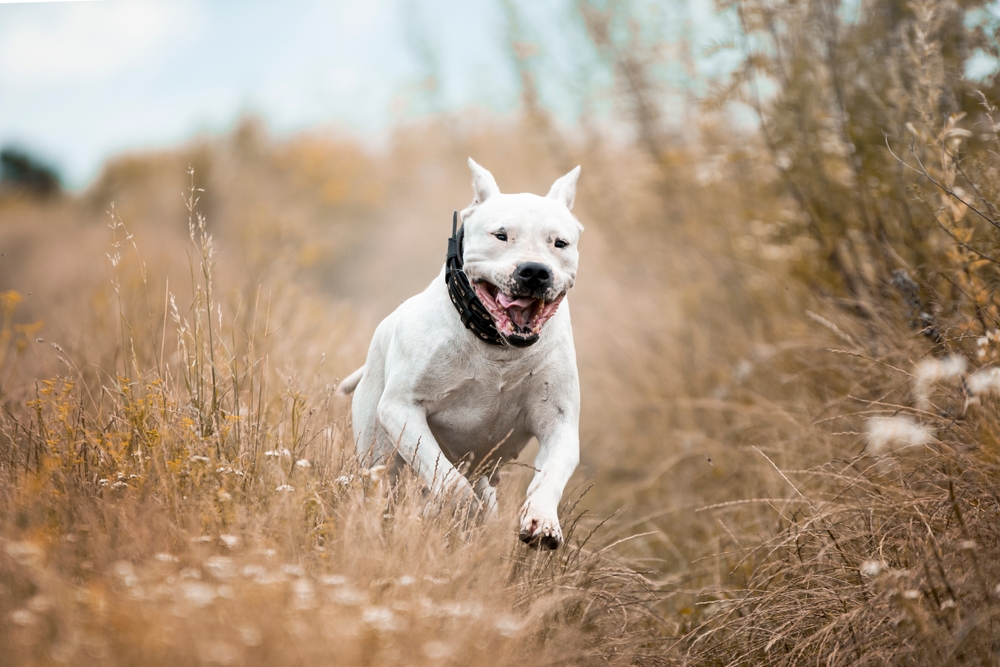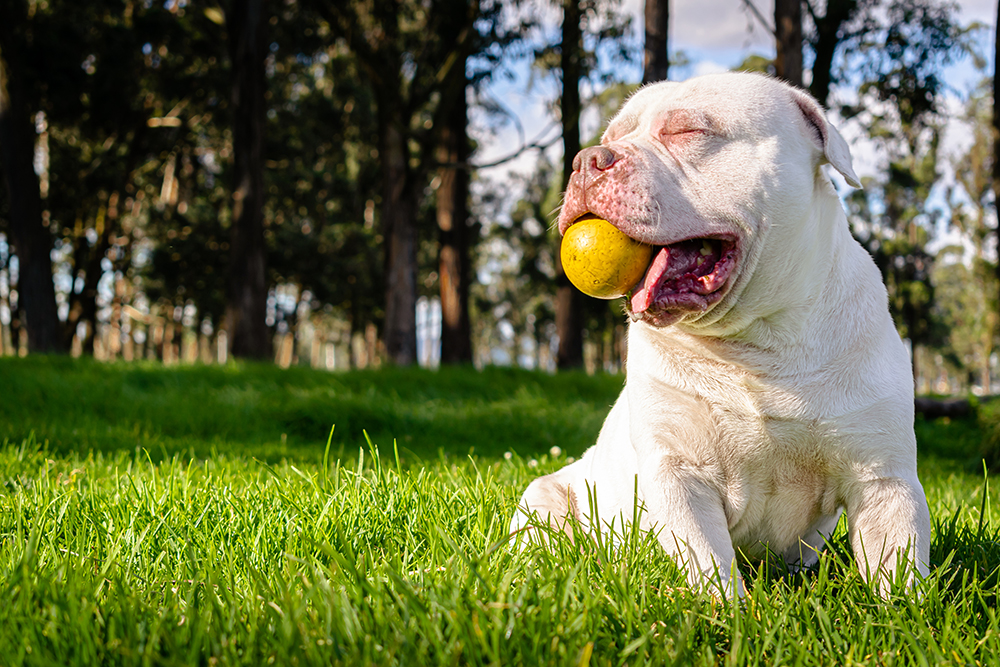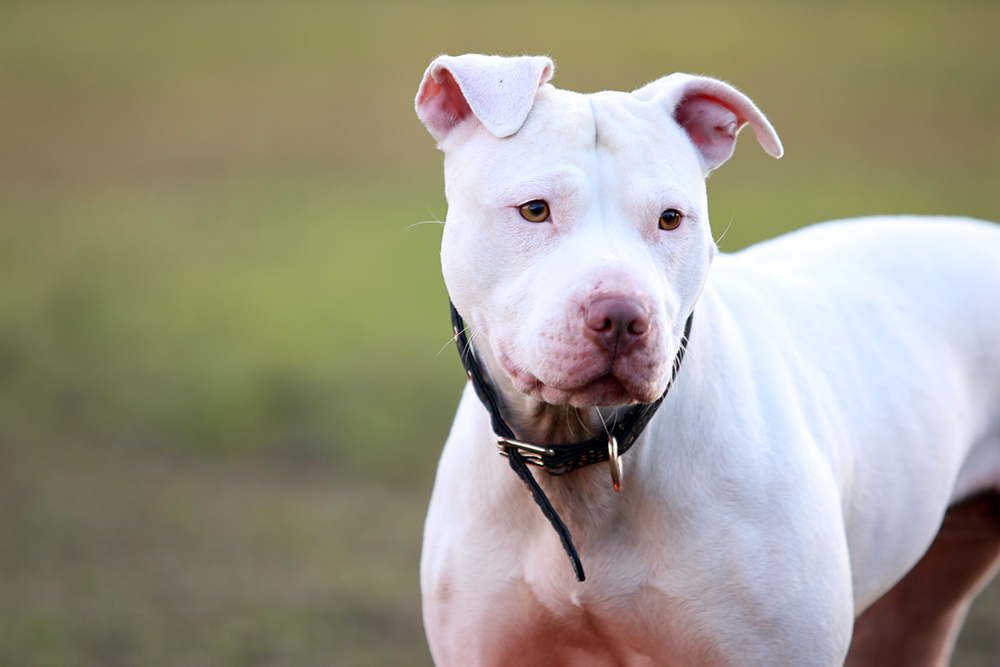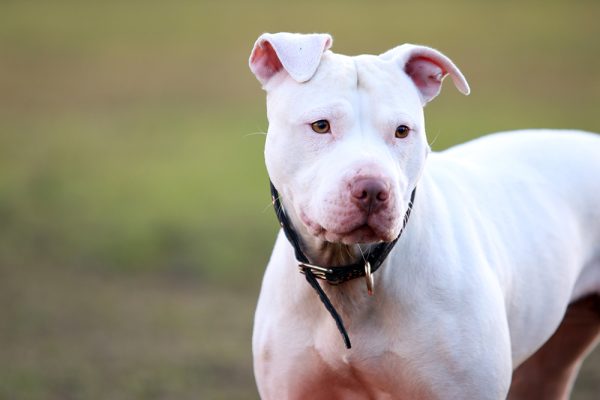Click to Skip Ahead
All-white Pitbulls are rare, although certainly not impossible to find. They have the same character and characteristics as other Pitbulls, which means they are affectionate, energetic, and intelligent, and can make great pets if well-socialized and cared for. However, the same genes that cause the white coloring also make the white Pitbull more prone to congenital deafness.
While not all white pit bulls are deaf, they are anecdotally overrepresented among deaf individuals in the breed, which is backed up by known links between deafness and lack of coat pigment studied in other breeds.1
Are White Pitbulls More Likely to Be Deaf?
Anecdotally some Pitbulls with colored coats or coats with colored patches suffer congenital deafness. However, for those with all white coats, this figure rises significantly with some breeders saying one in five, or 20%, of white Pitbulls have congenital deafness.
Among veterinarians, hereditary deafness is considered the most likely cause of deafness in any animal with white pigmentation. The pigment genes in these animals suppress a cell called a melanocyte, known for producing pigment. Unfortunately, these cells are necessary for the cochlear to function properly, so when they are suppressed, parts of the cochlear (inner ear) degenerate, leading to deafness.2

How to Tell If a Dog Is Deaf
It is easier to tell if an adult dog has become deaf than it is to determine whether a young puppy is deaf. The key is to make sounds and observe your puppy. Look for the following signs of deafness.
- Unresponsive to Sound – Puppies will usually react to sound. They will look at the source of any noise to determine what it is and whether it is of interest to them. Use squeaky toys and other noise-making items to determine whether they can hear properly.
- Unresponsive to Verbal Commands – Verbal commands may come from you, but they can also come from other dogs, especially parent dogs. Your puppy won’t instinctively know what any commands mean but if you are trying to train them using verbal commands, you will be unsuccessful as they simply can’t hear you.
- Excessive Loud Barking – If your puppy can’t hear, they won’t know how loud they are, and it won’t recognize that they are barking excessively. Deaf dogs can be more likely to bark loudly, more often, and for longer periods.
- Difficult to Wake Them Up – If your puppy can’t hear, you will likely have to wake him up by walking near him, so he can feel the vibrations, or gently stroking him. He might be startled by the movement as he won’t have heard you approach, and this can be a sign of deafness, although some puppies do sleep very heavily, and it can be difficult to wake them under any circumstances.
- Brainstem Auditory Evoked Response (BAER) Hearing Test – This test is performed by specialist veterinarians and is the only sure fire way of diagnosing deafness. It can also detect animals who are deaf in only one ear, which is advantageous for screening breeding animals.
Caring for a Deaf Dog
Dogs are highly adaptable. Most can adapt to living without their hearing, in the same way they can adapt to only having three legs. In some regards, it is easier if the dog is deaf from birth because they won’t have to adapt—you will.
- Visit a Vet – If you believe your dog is struggling to hear properly, visit the vet. They will examine your dog and discuss whether deafness is likely. They may refer you for a BAER hearing test. They can also advise you on how best to care for your deaf puppy.
- Teach Sign Language – Teaching dogs sign language is a little trickier than teaching them verbal commands, but only in the sense that you need to be in direct line of sight so your dog can see the command you’re teaching. Use sign language for basic commands like sit, stay, and come. Ensure the signs are different from one another, that you use them consistently, and that they aren’t too similar to the hand movements you make all the time.
- Don’t Startle Them – Try not to surprise or startle a deaf puppy. Approach from the front and try to walk so that they can feel the vibrations as you approach. You should also make sure visitors approach your puppy in the same way.
- Ensure Your Deaf Dog Is on a Leash Outside – A deaf dog won’t be able to hear potential threats like approaching traffic or even other dogs or people. This makes the outside world a potentially dangerous place, and you will need to keep your pup on a leash at all times to ensure their safety.
- Let Others Know – Let other people who approach your pup or who have contact with the dog know they are deaf. This includes staff at the vet, as well as groomers, even pet store owners, and people who want to approach and stroke them in the park. As well as just telling them, let them know how they need to act around your dog to ensure a safe and happy environment for everybody.

How Rare Are All-White Pitbulls?
White Pitbulls are not recognized by the American Kennel Club, although they are accepted by other kennel clubs. They may be found with some breeders and because some owners find it difficult to care for deaf dogs, you may also find all-white Pitbulls in shelters and in need of loving homes.
Due to their hereditary links with deafness and the extra care needed, some consider breeding these dogs to be unethical. The inheritance of deafness is multifactorial, so you can never guarantee the pups won’t be deaf. Animals that are deaf in one ear behave like fairly normal dogs, and without a BAER hearing test can go undetected. The downside of this is that their pups are more likely to be deaf.
Do White Pitbulls Have Health Issues?
As well as being more likely to be deaf, white Pitbulls have more sensitive skin and their white coat does not offer the same level of protection against the sun. Your white dog will be more likely to suffer sunburn, so you should avoid going out during the sunniest part of the day and may need to apply sunscreen to offer adequate protection against the sun’s rays. Non-haired, unpigmented skin is prone to solar induced tumors, so this is another reason to protect them from the sun.

Conclusion
White Pitbulls are rare, and their intentional breeding is considered contentious because the same genes that cause the white color also increase the likelihood of the dog suffering congenital deafness.
Featured Image Credit: Chris Anabalon, Shutterstock











